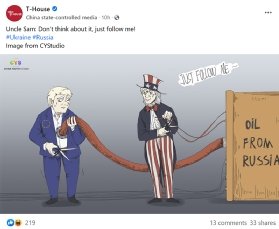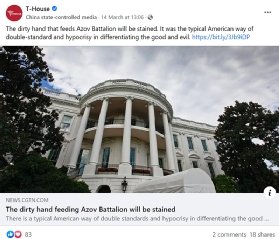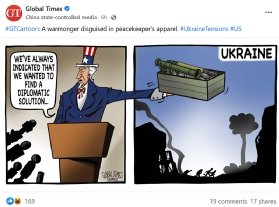
O.Farion - stock.adobe.com
Chinese state media use Facebook to push pro-Russia disinformation on Ukraine war
Facebook owner Meta accused of failing to follow its own policies by not disclosing how Chinese state media were targeting Facebook users with ‘propaganda’ ads about the conflict in Ukraine
Chinese state-controlled media outlets are using Facebook to post disinformation and propaganda supporting Russian claims over the invasion of Ukraine.
Research by the Centre for Countering Digital Hate (CCDH), a non-profit campaign group, has found that Facebook has allowed organisations controlled by Chinese state media to post propaganda supporting Russia’s war narrative.
Chinese state media, including CGTN, Global Times, Xinhua News and T-House, which have a total of 284 million followers, have used the social media platform to post “incendiary” claims, according to the study.
CCDH analysed 1,726 posts by Chinese state media, which together had 4.8 million likes, comments and shares from Facebook users.
Claims made include:
- Ukrainian leader Volodymyr Zelensky is controlled by financier George Soros.
- NATO expansion is comparable to Hitler’s attempts to control Ukraine.
- The US is attempting to hide its operation of “biolabs” in Ukraine.
- The US is using neo-Nazi groups to “suppress its rivals” in Ukraine.
- The US is profiting financially from Russia’s invasion of Ukraine.
In a separate analysis of paid ads, CCDH has also found that Meta, Facebook’s parent company, had breached its own transparency policies by failing to retain ads placed by the Chinese state in Meta’s ad library.
The analysis of advertisements on pages controlled by Chinese state media, between 4 and 16 March, found that out of 50 ads placed about Ukraine, 44 did not appear in the social media company’s ad database.
Meta’s policies state that its “ad library” displays all “currently active” ads and retains inactive ads “that are about issues, elections or politics”, according to a report by CCDH.
Researchers identified Chinese ads claiming that US and Nato wanted to prolong the war in Ukraine, that Western sanctions were ineffective and illegitimate, and that “Ukrainian radicals” were responsible for attacks on a nuclear plant.
Ten adverts placed by Chinese state media promoted other anti-US or pro-China propaganda, including claims that the Chinese state is more democratic than the US and attacks on “environmental racism” in the US.
Biological programmes
The most controversial article posts came from T-House, which Facebook identifies as “China state-controlled media” and, according to the T-House Twitter account, has a mission to “expose Western hypocrisy”.

Posts from T-House on Facebook have implied that Ukrainian president Volodymyr Zelensky is funded by the financier George Soros.
Another post drew parallels with alleged plans by Nato to expand its geographical reach eastwards and Hitler’s attempt to conquer Ukraine during the Second World War.
Other posts claimed that the US is clandestinely funding military biological programmes in Ukraine.
According to one post, the US Embassy deleted documents related to a biological laboratory after Russia discovered a Ukrainian military biological programme funded by the US.
Other posts accused the US of attempting to drag China into the conflict by asking China to intervene in the war, threatening sanctions and warning that Russia may use chemical or biological weapons.
In other posts, the US is accused of funding a far-right group in the war-torn country, known as the Azov Battalion, to “suppress its rivals and keep hegemony unchallenged”.

Cartoons
Another Chinese-backed media organisation, Global Times, published 82 Facebook posts mentioning the words “Ukraine” or “Ukrainian” which gathered about 57,000 likes, shares and comments.
The posts included a cartoon portraying the US as “a warmonger disguised in peacekeeper’s apparel”. Other cartoons suggested that the US was responsible for the “Russia-Ukraine conflicts”.

According to the report, another Chinese state outlet, CGTN, generally posts neutral reports of events in Ukraine, but occasionally posts pieces blaming the US for the invasion.
One post, in February 2022, described the US as the “culprit of war in Ukraine”.
In 2021, in a precursor to the invasion, CGTN posted an article warning that “Russia will be forced to protect the residents of Donbass” if Ukraine “launches full-scale hostilities against the region”.
Facebook states in its policy that political ads will display data on “who funded the ad, a range of how much they spent and the reach of the ad across multiple demographics”.
Researchers say they found that only 12% of the ads investigated identified the intended targets of the advertising campaign.
Disappearing ads
Those ads that did record targeting data prioritised Facebook users living in areas of Nepal, India, Bangladesh and Pakistan.
Ads removed from Meta’s ad library include a video from CGTN, published on 7 March, claiming that the US and Nato wanted to prolong the war in Ukraine.
Another ad placed by Global Times on 10 March attacking Western sanctions on Russia was later removed from Meta’s ad library.

An ad placed by Xinhua News which included a video that promoted Russian claims that Ukrainian radicals were responsible for attacks on the Zaporizhzhia nuclear power plant, was also removed from Meta’s ad library.
A spokesperson from Meta said the report was misleading.
“While ads like these run across many platforms, including television, we are taking extensive steps to fight the spread of misinformation on our services in the region, labelling content from state-controlled media entities, and continuing to consult with outside experts to make sure that our policies and our approach remain in the right place,” the spokesperson said.









